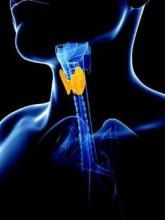Current evidence is insufficient to assess the balance of benefits and harms of routinely screening nonpregnant, asymptomatic adults for thyroid dysfunction, according to a U.S. Preventive Services Task Force recommendation statement published online March 24 in the Annals of Internal Medicine.
In particular, there is not enough evidence to either support or refute the idea that such screening leads to clinically important benefits, such as reducing the incidence of cardiovascular disease and its related morbidity and mortality. Nor is there evidence that screening leads to early detection and treatment, which, in turn, improves quality of life or is beneficial for blood pressure, body mass index, bone mineral density, lipid levels, or cognitive function, said Dr. Michael L. LeFevre, chair of the task force and professor of family medicine at the University of Missouri–Columbia, and his associates.
On the other hand, the evidence concerning the harms of screening asymptomatic adults is also inadequate. It seems likely, but has not yet been proved, that screening large numbers of asymptomatic patients would result in frequent false-positive results and a “large degree” of overdiagnosis and overtreatment, given that only 3%-5% of adults have subclinical hypothyroidism and only 0.7% have subclinical hyperthyroidism. And the negative psychological effects of being labeled as chronically ill haven’t been well studied, either, the task force noted.
Regardless of this lack of evidence, it appears that many primary care providers already screen for thyroid dysfunction. Exact estimates are not available, but one brand of thyroid hormone is the most commonly prescribed drug in the country, and the number of filled prescriptions for levothyroxine rose 42% in a recent 5-year period. Given the high number of prescriptions and the low prevalence of overt thyroid dysfunction, “it is reasonable to conclude that many asymptomatic persons receive treatment. Clinicians seem to be treating more persons for thyroid dysfunction, at earlier times after initial diagnosis, and at TSH [thyroid-stimulating hormone] levels closer to normal,” Dr. LeFevre and his associates wrote (Ann. Intern. Med. 2015 March 24 [doi:10.7326/M15-0483]).
The USPSTF recommendation statement, an update of the one issued in 2004, uses a more limited definition of thyroid disease, restricting the term to denote only symptomatic “overt” hypothyroidism and hyperthyroidism (defined as persistently abnormal serum TSH and T4 levels with clearly associated clinical signs and symptoms that cannot be explained by another condition). The task force made this change to emphasize that screening can detect biochemical abnormalities as well as clinically important disease. However, “despite this change the USPSTF’s ultimate assessment is the same as in the previous recommendation,” the investigators added.
The USPSTF is an independent voluntary group of experts funded through congressional mandate by the Agency for Healthcare Research and Quality to make recommendations about the effectiveness of specific preventive care services for asymptomatic patients. Dr. LeFevre’s and his associates’ financial disclosures are available at www.uspreventiveservicestaskforce.org.
To obtain a copy of the recommendation statement, contact www.uspreventiveservicestaskforce.org.


